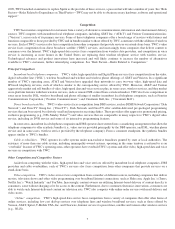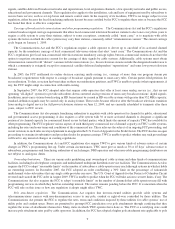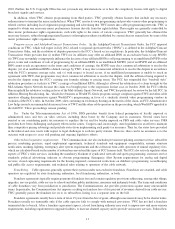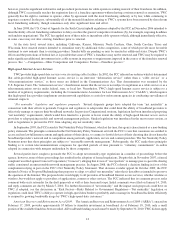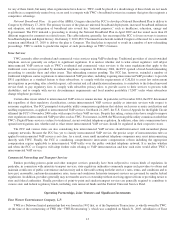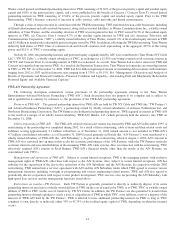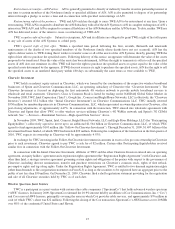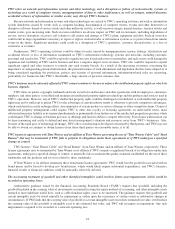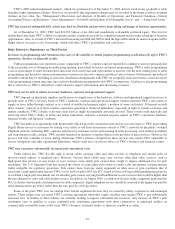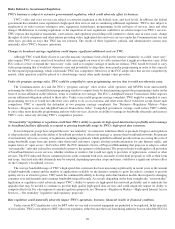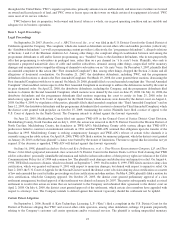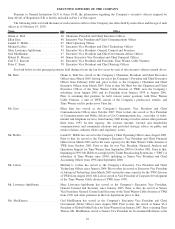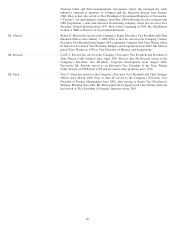Time Warner Cable 2009 Annual Report Download - page 29
Download and view the complete annual report
Please find page 29 of the 2009 Time Warner Cable annual report below. You can navigate through the pages in the report by either clicking on the pages listed below, or by using the keyword search tool below to find specific information within the annual report.competitors expand their service bundles to include compelling wireless features before TWC has rolled out equivalent or more
compelling offerings, TWC may not be in a position to provide a competitive service offering and its growth, business and financial
results may be adversely affected.
Risks Related to TWC’s Operations
A prolonged economic downturn, especially a continued downturn in the housing market, may negatively impact TWC’s ability to
attract new subscribers and generate increased subscription revenues.
The United States economy has experienced a period of slowdown, and the future economic environment may continue to be less
favorable than that of prior years. A continuation or further weakening of these economic conditions could lead to further reductions in
consumer demand for the Company’s services, especially premium services and DVRs, and a continued increase in the number of homes
that replace their wireline telephone service with wireless service, which would negatively impact TWC’s ability to attract customers,
increase rates and maintain or increase subscription revenues. In addition, providing video services is an established and highly
penetrated business. TWC’s ability to achieve incremental growth in video subscribers is dependent to a large extent on growth in
occupied housing in TWC’s service areas, which is influenced by both national and local economic conditions. If growth in the number of
occupied homes in TWC’s operating areas continues to decline, it may negatively impact TWC’s ability to gain new video subscribers.
TWC’s business is characterized by rapid technological change, and if TWC does not respond appropriately to technological changes,
its competitive position may be harmed.
TWC operates in a highly competitive, consumer-driven and rapidly changing environment and its success is, to a large extent,
dependent on its ability to acquire, develop, adopt and exploit new and existing technologies to distinguish its services from those of its
competitors. If TWC chooses technologies or equipment that are less effective, cost-efficient or attractive to its customers than those
chosen by its competitors, or if TWC offers services that fail to appeal to consumers, are not available at competitive prices or that do not
function as expected, TWC’s competitive position could deteriorate, and TWC’s business and financial results could suffer.
The ability of TWC’s competitors to acquire or develop and introduce new technologies, products and services more quickly than
TWC may adversely affect TWC’s competitive position. Furthermore, advances in technology, decreases in the cost of existing
technologies or changes in competitors’ product and service offerings also may require TWC in the future to make additional research
and development expenditures or to offer at no additional charge or at a lower price certain products and services TWC currently offers to
customers separately or at a premium. In addition, the uncertainty of the costs for obtaining intellectual property rights from third parties
could impact TWC’s ability to respond to technological advances in a timely manner.
Significant unanticipated increases in the use of bandwidth-intensive Internet-based services could increase TWC’s costs.
The rising popularity of bandwidth-intensive Internet-based services poses special risks for TWC’s high-speed data service.
Examples of such services include peer-to-peer file sharing services, gaming services and the delivery of video via streaming technology
and by download. If heavy usage of bandwidth-intensive services grows beyond TWC’s current expectations, TWC may need to invest
more capital than currently anticipated to expand the bandwidth capacity of its systems or TWC’s customers may have a suboptimal
experience when using TWC’s high-speed data service. In order to continue to provide quality service at attractive prices, TWC needs the
continued flexibility to develop and refine business models that respond to changing consumer uses and demands and to manage
bandwidth usage efficiently. TWC’s ability to do these things could be restricted by legislative or regulatory efforts to impose so-called
“net neutrality” requirements on cable operators. See “—Risks Related to Government Regulation—‘Net neutrality’ legislation or
regulation could limit TWC’s ability to operate its high-speed data business profitably and to manage its broadband facilities efficiently
to respond to growing bandwidth usage by TWC’s high-speed data customers.”
TWC may encounter unforeseen difficulties as it increases the scale of its service offerings to commercial customers.
TWC has sold video, high-speed data, network and transport services to businesses for some time and, in 2007, introduced an
IP-based telephony service, Business Class Phone, geared to small- and medium-sized businesses. In order to provide its commercial
customers with reliable services, TWC may need to increase expenditures, including spending on technology, equipment and personnel.
If the services are not sufficiently reliable or TWC otherwise fails to meet commercial customers’ expectations, the growth of its
commercial services business may be limited. In addition, TWC faces competition from the existing local telephone companies as well as
from a variety of other national and regional business services competitors. If TWC is unable to successfully attract and retain
commercial customers, its growth, financial condition and results of operations may be adversely affected.
17


